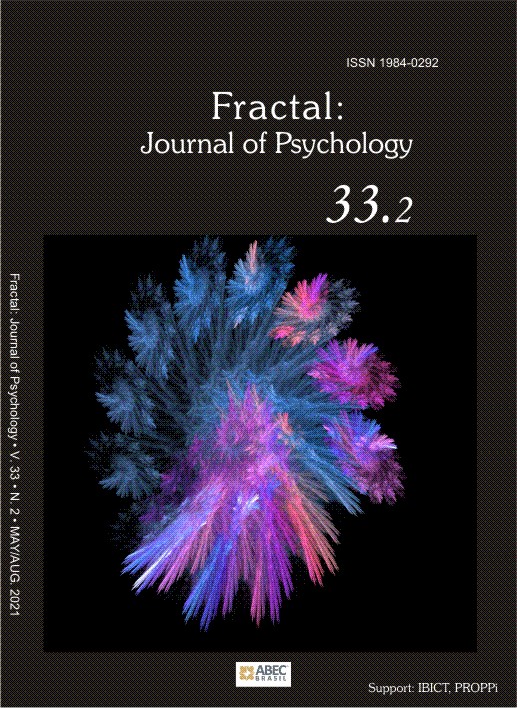Deleuzian contagions about the body of/in the clinic
DOI:
https://doi.org/10.22409/1984-0292/v33i2/5933Keywords:
body, clinic, affections, production of subjectivityAbstract
This research proposes to investigate the concept of the body according to the philosopher Gilles Deleuze and its possible interfaces with the clinic, using as intercessors some of his dialogues with Nietzsche and Espinosa. For this, we sought the definitions of body for Nietzsche and Espinosa. For the first, the body is a relation of forces, and for the second, it is characterized by its power of affection. Based on Deleuze’s reading of them, corporality can be understood as processuality, permeated by the intensive states that pass through bodies. Deleuze’s theoretical encounters make the clinic think about how the body can be an instrument of self-invention, as this is where the processes of subjectivity occur. Experimentation, therefore, constitutes an ethical compromise of a clinic that is invented at each meeting. Therefore, the potency to cast the bodies for the exercise of creation is problematized.
Downloads
References
BORGES, Hélia. O movimento: o corpo e a clínica [online]. São Paulo: Cia do eBook, 2016. Disponível em: https://books.google.com.br/books?id=MCLcCwAAQBAJ&lpg=PT13&dq=nas%20dobras%20do%20corpo%20por%20uma%20cl%C3%ADnica%20das%20intensidades&hl=pt-BR&pg=PT13#v=onepage&q&f=false. Acesso em: jul. 2016.
COSTA, Fabiana Tomazzoni; MOEHLECKE, Vilene; FONSECA, Tania Mara Galli. Abrir o corpo da clínica. In: FONSECA, Tania Mara Galli; ENGELMAN, Selda (Org.). Corpo, Arte e Clínica. Porto Alegre: UFRGS, 2004. p. 299-304.
DELEUZE, Gilles. Nietzsche e a filosofia. Rio de Janeiro: Editora Rio, 1976.
DELEUZE, Gilles. Espinosa: filosofia prática. São Paulo: Escuta, 2002a.
DELEUZE, Gilles. A imanência: uma vida…. Educação & Realidade [online], Porto Alegre, v. 27, n. 2, p. 1-9, 2002b. Disponível em: https://seer.ufrgs.br/educacaoerealidade/article/view/31079. Acesso em: 13 maio 2020.
DELEUZE, Gilles; GUATTARI, Félix. O Anti-Édipo: capitalismo e esquizofrenia. Rio de Janeiro: Imago, 1976.
DELEUZE, Gilles; GUATTARI, Félix. O que é a filosofia? São Paulo: Editora 34, 1992.
DELEUZE, Gilles; GUATTARI, Félix. Mil Platôs: capitalismo e esquizofrenia. São Paulo: Editora 34, 1995. v. 1.
DELEUZE, Gilles; PARNET, Claire. Diálogos. São Paulo: Escuta, 1998.
ESPINOSA, Baruch. Ética. Belo Horizonte: Autêntica, 2009.
FRAGA JÚNIOR, Órfilo Rodrigues. Corpo, força e potência: Nietzsche e Spinoza no pensamento de Deleuze. 2013. 114 f. Dissertação (Mestrado em Filosofia) – Programa de Pós-graduação em Filosofia, Universidade Federal de Uberlândia, Uberlândia, 2013. Disponível em: https://repositorio.ufu.br/bitstream/123456789/15569/1/Orfilo%20Rodrigues.pdf. Acesso em: 13 maio 2020.
GIL, José. Abrir o corpo. In: FONSECA, Tania Mara Galli; ENGELMAN, Selda (Org.). Corpo, Arte e Clínica. Porto Alegre: UFRGS, 2004. p. 13-28.
GUATTARI, Félix. Caosmose: um novo paradigma estético. São Paulo: Editora 34, 1992.
GUATTARI, Félix; ROLNIK, Suely. Micropolítica: cartografias do desejo. Petrópolis: Vozes, 1999.
LIBERMAN, Flavia. O corpo como produção da subjetividade. Cadernos de Subjetividade - Dossiê: Corpo, São Paulo, v. 5, n. 2, p. 371-383, 1997. Disponível em: http://docs.google.com/fileview?id=0Byhsw-4JHq9gNTY4NmY1MGUtZWU4MC00ZjBmLTllYTAtOTU5NTZhZjk1MTZh&hl=pt_BR. Acesso em: 18 ago. 2020.
LIMA, Elizabeth M. F. de Araújo. Artes menores: criação de si e de mundos nas ações em saúde mental. In: AMARANTE, Paulo; NOCAM, Fernanda (Org.). Saúde mental e arte: práticas, saberes e debates. São Paulo: Zagadoni, 2012. p. 39-52.
NIETZSCHE, Friedrich. Assim falou Zaratustra. Rio de Janeiro: Civilização Brasileira, 1983.
ORLANDI, Luiz B. L. Deleuze. In: PECORARO, Rossano (Org.). Os filósofos. Petrópolis: Vozes, 2009. v. 3, p. 256-279. Coleção Clássicos da Filosofia.
PASSOS, Eduardo; BENEVIDES, Regina. O que pode a clínica: a posição de um problema e de um paradoxo. In: FONSECA, Tania Mara Galli; ENGELMAN, Selda (Org.). Corpo, arte e clínica. Porto Alegre: UFRGS, 2004. p. 275-286.
PASSOS, Eduardo; BENEVIDES, Regina. Passagens da clínica. In: MACIEL, Auterives; KUPERMANN, Daniel; TEDESCO, Silvia (Org.). Polifonias: clínica, política e criação. Rio de Janeiro: Contracapa, 2006. p. 89-100.
RAUTER, Cristina; RESENDE, Catarina. Arte, clínica e transdisciplinaridade. Polêm!ca, Rio de Janeiro, v. 15, n. 3, p. 1-12, 2015. https://doi.org/10.12957/polemica.2015.19362
RESENDE, Catarina Mendes. Escutar com o corpo: a experiência sensível entre dança, poesia e clínica. 2013. 218 f. Tese (Doutorado) – Programa de Pós-graduação em Psicologia da Universidade Federal Fluminense, Niterói, 2013.
ROLNIK, Suely B. “Fale com ele” ou como tratar o corpo vibrátil em coma. In: FONSECA, Tania Mara Galli; ENGELMAN, Selda (Org.). Corpo, arte e clínica. Porto Alegre: UFRGS, 2004. p. 231-238.
SANDER, Jardel. Corpo-dispositivo: cultura, subjetividade e criação artística. Artcultura (UFU), Uberlândia, v. 13, n. 23, p. 129-142, 2011. Disponível em: http://www.seer.ufu.br/index.php/artcultura/article/view/15129. Acesso em: 12 jul. 2020.
VIESENTEINER, Jorge Luiz. Experimento e vivência: a dimensão da vida como pathos. 2009. 337 f. Tese (Doutorado) – Instituto de Filosofia e Ciências Humanas, Universidade Estadual de Campinas, Campinas, 2009. Disponível em: http://www.repositorio.unicamp.br/handle/REPOSIP/280812. Acesso em: 14 ago. 2019.
ZEPPINI, Paola Sanfelice. Deleuze e o corpo: articulações conceituais entre Deleuze, Nietzsche e Espinosa em função da problemática do corpo. 2010. 153 f. Dissertação (Mestrado) – Instituto de Filosofia e Ciências Humanas, Universidade Estadual de Campinas, Campinas, 2010. Disponível em: http://repositorio.unicamp.br/jspui/handle/REPOSIP/278826. Acesso em: 12 out. 2019.
Downloads
Published
Versions
- 2021-11-13 (2)
- 2021-08-31 (1)
How to Cite
Issue
Section
License
Copyright (c) 2021 Fractal: Journal of Psychology

This work is licensed under a Creative Commons Attribution 4.0 International License.
Authors publishing in this journal agree to the following terms:
- Authors retain copyright and grant the journal the right of first publication, with the work simultaneously licensed under the Creative Commons Attribution License allowing sharing of the work with acknowledgement of authorship of the work and initial publication in this journal.
- Authors are permitted to enter into additional contracts separately for non-exclusive distribution of the version of the work published in this journal (e.g., publishing in an institutional repository or as a book chapter), with acknowledgment of authorship and initial publication in this journal.

This work is licensed under a Creative Commons Attribution 4.0 International License.
To the extent possible under the law, Fractal: Journal of Psychology has waived all copyright and related rights to the Reference Lists in research articles. This work is published in: Brazil.
To the extent possible under law,Fractal: Journal of Psychology has waived all copyright and related or neighboring rights to Reference lists in research articles. This work is published from: Brazil.







